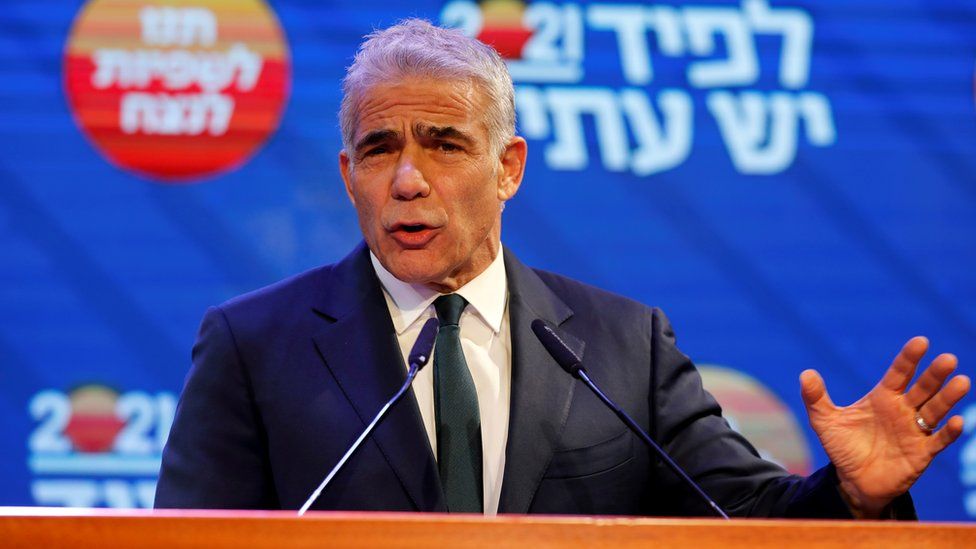Prime Minister Benjamin Netanyahu is predicted to fall short of securing the seats needed to form a new government in Israel's fourth election in two years, according to exit polls.
Mr Netanyahu's Likud party and its allies are projected to win 52 or 53 seats in the 120-seat Knesset.
Parties opposed to the prime minister staying in office look set to win 60.
It means that even with the support of the nationalist Yamina party, Mr Netanyahu would not have a majority.
Yamina, led by former Netanyahu loyalist Naftali Bennett, is forecast to win seven seats, but has not explicitly declared which side it will support.
"I will do only what is good for the State of Israel," Mr Bennett said in a statement after the exit polls were released.
He added that he had told Mr Netanyahu that Yamina would await the final results before deciding on its next steps.
Israel's Central Elections Committee does not expect all of the votes to be counted before Wednesday afternoon due to coronavirus-related restrictions.
Mr Netanyahu thanked his supporters in a tweet late on Tuesday. "You gave a huge win to the right and Likud under my leadership. Likud is the biggest party by far."
"It's clear most Israelis are right-wing, and want a strong, stable right-wing government," he added.
Meanwhile the main opposition leader Yair Lapid, whose centrist Yesh Atid party is projected to win between 16 and 18 seats in the Knesset, said he was "proud" of his party's "enormous" achievement.

"I have already begun this evening to hold talks with some of the leaders of the bloc for change and will continue in the next few days," he said, adding that he would "do everything possible to establish a sane government in the State of Israel".
Just over 67.2% of those eligible cast their ballots in the election, which was widely seen as a referendum on Mr Netanyahu's leadership.
The 71-year-old prime minister has been in power continuously since 2009, having served an earlier three-year term in the late 1990s.
His campaign focused on Israel's world-leading Covid-19 vaccination programme and his diplomatic success in normalising ties with some Arab countries.
But his opponents from across the political spectrum argued that he should not remain in office while standing trial on corruption charges. He denies any wrongdoing.
After the previous three elections neither Mr Netanyahu nor his rivals were able to form a stable governing coalition.
The current national unity government, which was the result of a power-sharing deal with Defence Minister Benny Gantz, collapsed in December after just seven months.
Mr Gantz, whose Blue and White party is projected by the exit polls to win seven seats, said on Tuesday that he would "do everything I can to unite the pro-change bloc" - a reference to those wanting a new prime minister.
If negotiations to form a government fail again, it could force a fifth election.
Latest Stories
-
NDC administration will reverse all ‘last-minute’ gov’t employee promotions – Asiedu Nketiah
2 minutes -
Kudus sights ‘authority and kingship’ for elephant stool celebration
3 minutes -
We’ll embrace cutting-edge technologies to address emerging healthcare needs – Prof. Antwi-Kusi
36 minutes -
Nana Aba Anamoah, Cwesi Oteng to attend Philip Nai and Friends’ charity event
41 minutes -
Environmental protection officers receive training on how to tackle climate change
44 minutes -
CLOGSAG vows to resist partisan appointments in Civil, Local Government Service
2 hours -
Peasant Farmers Association welcomes Mahama’s move to rename Agric Ministry
2 hours -
NDC grateful to chiefs, people of Bono Region -Asiedu Nketia
2 hours -
Ban on smoking in public: FDA engages food service establishments on compliance
2 hours -
Mahama’s administration to consider opening Ghana’s Mission in Budapest
2 hours -
GEPA commits to building robust systems that empower MSMEs
2 hours -
Twifo Atti-Morkwa poultry farmers in distress due to high cost of feed
2 hours -
Central Region PURC assures residents of constant water, power supply during yuletide
2 hours -
Election victory not licence to misbehave – Police to youth
2 hours -
GPL 2024/2025: Nations thrash struggling Legon Cities
2 hours

